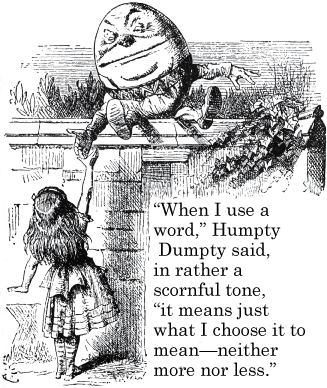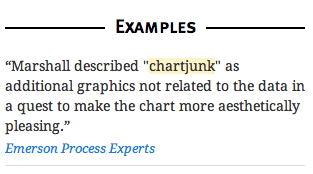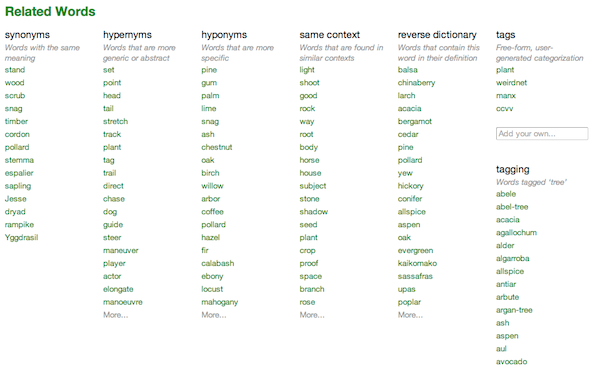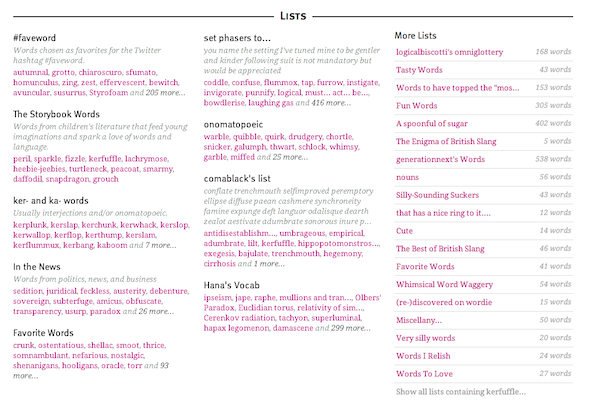About Wordnik
This page will give you a quick overview of what you can do, learn, and share with Wordnik.
What is Wordnik?
Wordnik is the world's biggest online English dictionary, by number of words.
Wordnik is a 501(c)(3) nonprofit organization, and our mission is to find and share as many words of English as possible with as many people as possible.
Definitions
Wordnik shows definitions from multiple sources, so you can see as many different takes on a word's meaning as possible. For more information about the sources of our dictionary definitions, please see the Colophon page.
Wordnik doesn't yet allow user-contributed definitions. If you'd like to add a definition, you can log in and leave a comment.
Examples
At Wordnik, we believe, like Humpty Dumpty, that words mean what we want them to mean:

We try to show as many real examples as possible for each word. These examples are ranked by how useful we think they are in helping you understand the meaning of a particular word, especially words that may not have traditional dictionary definitions. For instance, we try to find examples like this one, at chartjunk:

Wordnik includes example sentences from major news media (such as the Wall Street Journal and USA Today) and from books from Project Gutenberg and the Internet Archive, as well as from other sources across the web, including blogs.
Related Words
What do we mean by “related words”? Our word relationships include synonyms, hypernyms, hyponyms, words used in the same context, a reverse dictionary, and tags. But what does all of that mean?
Here are the related words for tree:

First up are synonyms, or words with the same or similar meaning, for instance, timber and sapling.
You'll also find hypernyms, otherwise known as superordinates, or words that are more generic or abstract than the given word. The prefix hyper- means "over, beyond, overmuch, above measure," so you can think of a hypernym as a sort of umbrella over more specific words. A hypernym for tree might be flora.
Hyponyms, or subordinates, are words that are more specific than the given word (the prefix hypo- means “under, beneath”). Simal, coralwood, kingwood, and willow are specific types of trees (hey, that would make a great list!).
Same context refers to words that might be used in a similar context, such as wood, grass, garden, and branch. (One could argue that branch is also a meronym, or "a term that names part of a larger whole," for tree.) We use the great resource WordNet for much of our hyponym and hypernym data.
The Reverse Dictionary section lists words that contain the given word in their definition.
Tags are created by logged-in Wordniks. Tags are anything you might use to label the given word (for instance, tree is tagged plant), and the Tagging section shows what words have been given the tag tree, including acacia, ash, and alder.
Lists
There are more than 30,000 lists on Wordnik! Any logged-in Wordnik can make one (or more, or many, many more) lists. Many words on Wordnik are included in multiple lists -- check out the word kerfuffle:

When you're logged in you'll see your own lists on the right:

To add a word to your list click the box:

To view the full list, hover over the list name and click on the word "view":

Want more about Wordnik lists? Check out this blog post about lists.
Comments
Logged-in Wordniks can leave comments on word pages, list pages, and user profile pages. To link to another word page from within a comment, use single brackets (like so: [word]). Simple links and formatting are also permitted.
Comments are the place to add new examples of a word's use, short definitions of your own, or simply your own opinion about a word.
Images
All our images come from Flickr, under a Creative Commons license. We pull images via the tags and text that the creators of the images assigned to it, which means that some images may be only loosely or metaphorically connected to the word being looked up. For instance, these are some of the images that may appear at the word honor:

Audio
Wordnik includes audio pronunciations from the The American Heritage® Dictionary of the English Language, Fourth Edition copyright © 2008, 2000 by Houghton Mifflin Harcourt Publishing Company. Updated in 2008 and the Macmillan Dictionary—Online English Dictionary and Thesaurus.
For more information about the sources of our audio pronunciations, please see the Colophon page.
Wordnik also includes sound effects for some words.
Favorites
Logged-in Wordniks can mark words as Favorites. When you "Love" a word it will be added to your list of Favorite Words, and it will get some special hearts (which only the person who favorited the word will see):

Word of the Day
Our word of the day is available Monday through Friday on the Word of the Day page (and is also available via email). To subscribe to the Word of the Day email, you must be a registered Wordnik. Log in to your account and check the "Subscribe to the Word of the Day" box in your user profile.
Random Word
Clicking on "Random Word" from the header of any Wordnik page will take to you a random word page.

Community
The Community page shows you what other Wordniks are doing with their lists, as well as recent activity, such as words that have been recently listed, the latest lists, and the most-commented-on lists and words. You can also find recently viewed words, the latest comments, recent pronunciations, and recent favorites.
Profile
Your Wordnik profile page is where you can keep track of your Wordnik activity, including your lists, favorite words, comments you've made, comments left for you by others, and your recent lookups. On your profile page you can also manage your email address and subscriptions to Word of the Day lists, and choose whether your profile is public (visible to everyone) or private (visible only to you).
Contact Us
Need to get in touch? You can reach us at feedback@wordnik.com
Or via postal mail at:
Wordnik
PO Box 15259
Portland OR 97293
More Information
For press information, check out our press page.
Here's a handy link to our media kit.